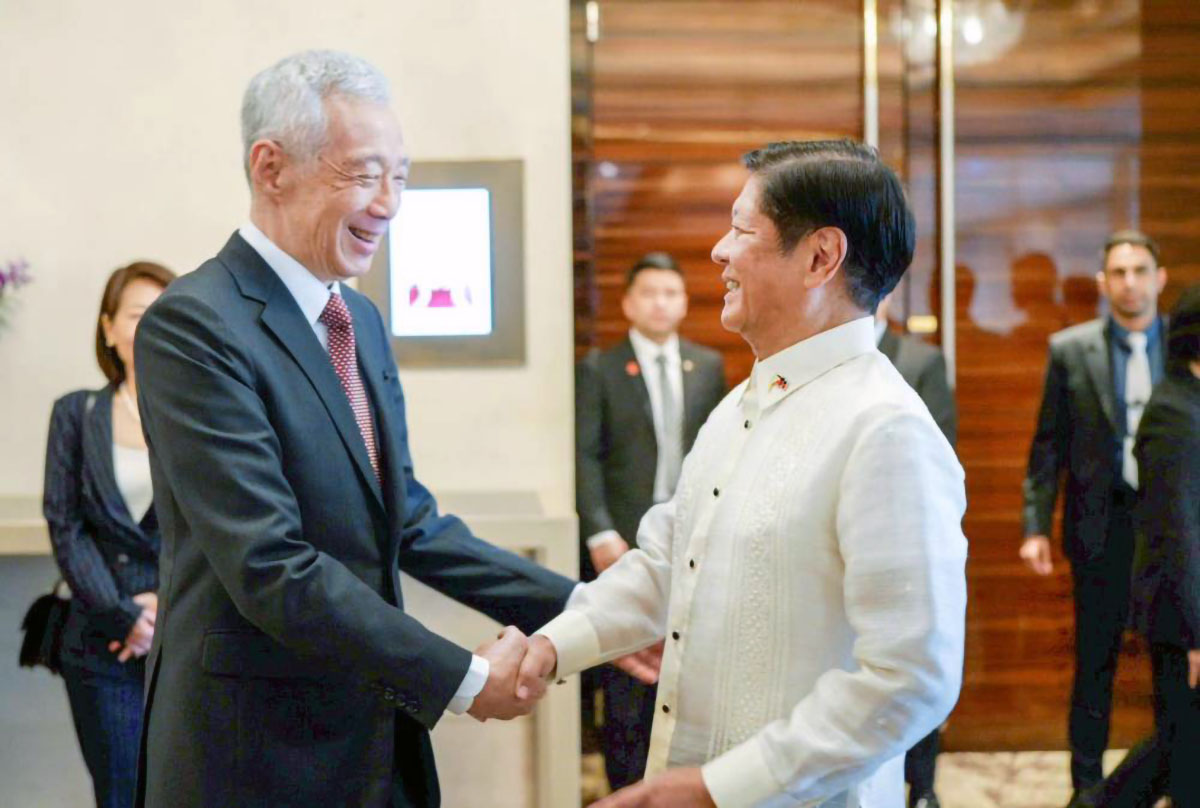
WELCOME BACK Former Prime Minister of Singapore Lee Hsien Loong greets President Marcos upon his arrival on Thursday. —PHOTO FROM PRESIDENTIAL COMMUNICATIONS OFFICE
SINGAPORE—The Philippines will do “whatever it takes to protect our sovereign home,” President Marcos said at the Shangri-La Dialogue here on Friday as the United States expressed concern over China’s recent order to detain “trespassers” in the West Philippine Sea (WPS) even if it is against international law.
Speaking at the forum organized by the Institute for Strategic Studies, the President said that Philippine claims in the South China Sea “are derived not from imagination, but from international law.”
“Unlike others, we have submitted our assertions to rigorous legal scrutiny by the world’s leading jurists,” Marcos said.
“We will never allow anyone to detach it from the totality of the maritime domain that renders our nation whole.”
He told world leaders, top defense and security officials present at the forum that the Philippines and like-minded nations are “the owners of the narratives of our regional community.”
The President conceded that China’s influence in the region “is permanent.”
“At the same time, the stabilizing presence of America is crucial to regional peace. It is never a choice. Both countries are important,” he said. “Thus, we reject any attempt to deny our strategic agencies, especially by forces that seek to subordinate our interests to theirs.”
Increase in military financing
Marcos made the remarks hours after US Sen. Christopher Coons said in Makati City that the US Congress is looking to increase foreign military financing (FMF) to the Philippines from $40 million to $500 million.
“There is widespread concern about the increased level of aggressiveness by the [People’s Republic of China] in how they have responded to fisherfolk just simply trying to continue to access historic locations that are within the Philippine exclusive economic zone,” Coons told the state-run Philippine News Agency (PNA) at a Makati hotel on Friday.
“You may have picked up that our politics are somewhat divided … but this is something that is broadly agreed on a bipartisan basis in the Senate and the House,” the PNA quoted Coons as saying.
Coons said the US Congress passed last month an appropriation of $2 billion for FMF in the Indo-Pacific region and the Philippines was “second core priority” next to Taiwan in the supplemental aid package.
At the same time, Armed Forces of the Philippine chief Gen. Romeo Brawner, who was also in Singapore, said Admiral Samuel Paparo, recently named commander of the US Indo-Pacific Command, also expressed to him concerns over China’s actions.
“Well, both our countries are concerned about it,” Brawner told reporters on the sidelines of the forum, ahead of the President’s keynote address.
Common US position
Brawner did not mention the FMF facility and did not elaborate on what he discussed with Paparo, except to say the meeting “went very well with the United States.”
Also on Friday, US Defense Secretary Lloyd Austin met for the first time with China’s Minister of National Defense, Admiral Dong Jun, on the sidelines of the regional defense forum.
The US Department of Defense said in a statement that Austin told Dong that the United States would “continue to fly, sail and operate—safely and responsibly—wherever international law allows.”
On the other hand, Coons, a member of the foreign relations and appropriations committees, revealed the hike in FMF after a visit to Taiwan with other members of a US congressional delegation.
He said talks were underway “to make sure that there’s an understanding of what sorts of systems, on what timeline” and how the financing would contribute to the AFP’s modernization.